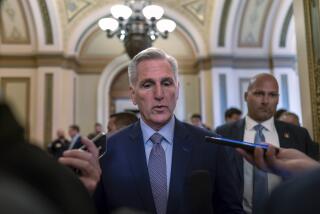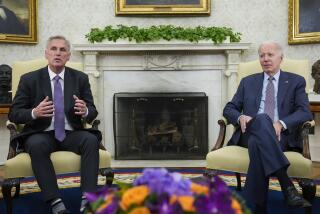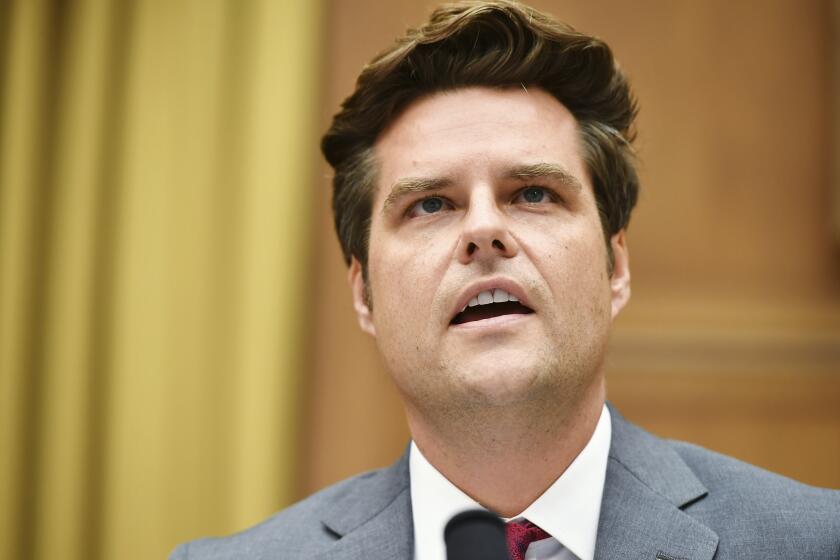Senate Democrats move to drop Medicare proposal
Reporting from Washington — Senate Democratic leaders, scrambling for the 60 votes they need to pass the healthcare overhaul bill, moved Monday to strike a controversial proposal for expanding Medicare and proceed without a new government insurance program, the so-called public option.
“It’s a matter of getting 60 senators,” Finance Committee Chairman Max Baucus (D-Mont.) told reporters after an evening meeting of the Democratic caucus in which party leaders stressed the urgency of getting a final Senate vote by next week.
The proposal to let Americans between 55 and 64 buy into Medicare looked like the key to a compromise last week. But Sen. Joe Lieberman (I-Conn.) stunned senior Democrats over the weekend with new threats to block the legislation if the Medicare provision was included.
Several leading liberal lawmakers on Monday appeared resigned to the collapse of their dream of including either a new government insurance plan to compete with private plans or the proposal to expand Medicare.
“There’s enough good in this bill that even without those two, we’ve got to move it,” said Sen. Tom Harkin (D-Iowa), who succeeded the late Sen. Edward M. Kennedy as chairman of the Senate Health Committee.
President Obama, who is pressing for Senate action on the bill by Christmas, meanwhile plans to host an unusual meeting with the entire Democratic caucus at the White House today to build more momentum behind the legislative push.
Senate Majority Leader Harry Reid (D-Nev.) is running out of time. If he wants to hold a vote before Dec. 23, he must take the first steps to cut off debate no later than Thursday, according to Democratic officials.
With 60 lawmakers in his caucus, including two independents, Reid must hold them all together -- or find GOP votes to offset any losses -- in order to overcome threatened Republican filibusters.
He and other senior Democrats had hoped that the carefully negotiated compromise worked out last week by a group of five conservative Democrats and five liberals could defuse the divisive debate over a new government insurance plan.
Now, the only vestige of the public option likely to survive in the Senate appears to be a provision that would trigger a government plan if new nonprofit insurance programs -- to be regulated by the government -- fail to compete with commercial insurers.
The recently passed House healthcare bill, which will have to be reconciled with the Senate version next year, includes a public option for Americans who do not get insurance through work.
Senators and senior Democratic aides stressed Monday that the issue would not be settled in the Senate until lawmakers get a report from the nonpartisan Congressional Budget Office about the cost of proposed changes to the healthcare bill, expected Wednesday.
Meanwhile, Reid is also trying to placate lawmakers who have concerns about other issues, including what some see as excessive concessions to the drug industry.
Reid pledged on the Senate floor that the final bill worked out between the House and Senate would close the so-called doughnut hole, a gap in Medicare prescription drug coverage that forces many seniors to pay for thousands of dollars’ worth of drugs out of their own pockets.
The Senate bill currently does not include such a provision, though it is in the legislation passed by the House.
Democrats moved toward dropping the Medicare expansion after a tense day of strategizing and negotiating on Capitol Hill.
Administration officials and senior Democrats focused especially on trying to head off a threatened filibuster from Lieberman and several other centrist lawmakers.
Lieberman said over the weekend that he would vote against the bill if it included the Medicare provision. The statement by the former Democratic vice presidential nominee angered Democrats in the Capitol and among the party’s grass roots.
But Lieberman emerged from the caucus meeting Monday night sounding upbeat about backing the legislation.
“Put me down as encouraged in the direction these discussions are going,” he said, disputing accusations that he has made himself a barrier to passing healthcare legislation.
“I don’t feel like a spoiler. I feel like someone who has wanted to be for healthcare reform.”
Under the tentative deal last week, lawmakers agreed to drop a proposal in the original legislation that would have created a national government insurance option as an additional choice for Americans who do not get coverage from work.
To assuage liberals, the pact added the Medicare buy-in provision.
Many Democrats embraced the trade-off, which they believed would be tolerated by Lieberman and Sens. Ben Nelson (D-Neb.) and Olympia J. Snowe (R-Maine), two other centrists being courted by Democratic leaders.
But Lieberman’s comments over the weekend, coupled with similar remarks by Nelson, both on CBS’ “Face the Nation,” threw the proposed compromise into doubt.
The death knell came Sunday, when Reid called Lieberman to his office after his appearance on “Face the Nation,” according to Senate aides briefed on the conversation.
Lieberman met with Reid as well as White House Chief of Staff Rahm Emanuel, Deputy Chief of Staff Jim Messina and White House Office of Health Reform Director Nancy-Ann DeParle.
Lieberman told them the core of the bill was fine with him, but he couldn’t support it with the Medicare provision, which he said would drive up federal spending.
Despite private frustration with the Connecticut senator, many Democrats appeared eager to move on. “I want to see healthcare reform,” said Sen. Sherrod Browd (D-Ohio), a leading proponent of creating a new government insurance plan. “There’s going to be a good bill.”
Sen. Arlen Specter (D-Penn.), who joined the party this year, drew applause for rallying the Democratic lawmakers gathered just off the Senate floor.
“I came to your caucus to be your 60th vote,” he said, according to a Democratic aide briefed on the meeting.
“Don’t let these obstructionists win.”
James Oliphant in the Washington bureau contributed to this report.
More to Read
Get the L.A. Times Politics newsletter
Deeply reported insights into legislation, politics and policy from Sacramento, Washington and beyond. In your inbox three times per week.
You may occasionally receive promotional content from the Los Angeles Times.












